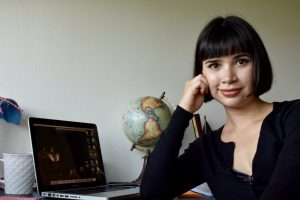 Nathalí Cordero-Quirós is a 3rd year PhD student in Climate Sciences at Scripps Institution of Oceanography. Advised by Dr. Arthur Miller, her current research focuses on the effects of El Niño Southern Oscillation over the physical state and biogeochemistry of the California Current System. She uses coupled climate models to evaluate the predictability of the ocean response along the U.S West Coast, and observations to perform model validations.
Nathalí Cordero-Quirós is a 3rd year PhD student in Climate Sciences at Scripps Institution of Oceanography. Advised by Dr. Arthur Miller, her current research focuses on the effects of El Niño Southern Oscillation over the physical state and biogeochemistry of the California Current System. She uses coupled climate models to evaluate the predictability of the ocean response along the U.S West Coast, and observations to perform model validations.
The Satellite Remote Sensing Training has been a great experience! I learned a lot about accessing and processing satellite data. I am particularly interested in using ocean color fields to detect trends and modes of variability of chlorophyll in the California Current System. The training was very useful for my current and future research since I also got to learn and practice Python tricks. Thank you Dr. Bruce Monger for all the teaching and the stories! I am also very grateful to OCB group for giving me the chance to participate in this enriching experience.
Jessie Turner is a 3rd year PhD student in Marine Science at William & Mary’s Virg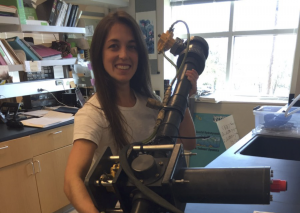 inia Institute of Marine Science, where she is advised by Drs. Carl and Marjorie Friedrichs. She investigates water clarity, light, and suspended particles in Chesapeake Bay from both observational and numerical modeling perspectives. Observationally, she measures local short-term water clarity at oyster aquaculture sites, and she analyzes long-term water clarity in Chesapeake Bay as a whole since the 1980s. In terms of modeling, she studies the interplay between sediment and nutrient loading, light availability, and water clarity using a hydrodynamic estuarine biogeochemical model for Chesapeake Bay.
inia Institute of Marine Science, where she is advised by Drs. Carl and Marjorie Friedrichs. She investigates water clarity, light, and suspended particles in Chesapeake Bay from both observational and numerical modeling perspectives. Observationally, she measures local short-term water clarity at oyster aquaculture sites, and she analyzes long-term water clarity in Chesapeake Bay as a whole since the 1980s. In terms of modeling, she studies the interplay between sediment and nutrient loading, light availability, and water clarity using a hydrodynamic estuarine biogeochemical model for Chesapeake Bay.
This course taught me everything that I did not know how to begin to approach on my own. In two weeks, Bruce Monger imparted on us a knowledge base and skillset that would have taken years to learn independently. Thanks to this course, I feel integrated into the world of ocean color. Dr. Monger not only made this course applicable by teaching us how to access and interpret the data, he also explained the history and workings of the NASA ocean color program. It was a pleasure to spend time with participants from so many different countries in Ithaca. I truly appreciate the opportunity provided by OCB to take this course, thank you!
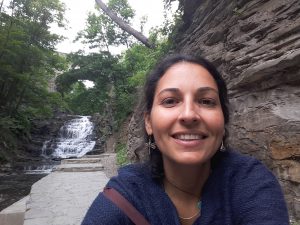 Suhey Ortiz is a PhD candidate at University of Puerto Rico, Department of Marine Sciences. Her work includes bio-optics and biogeochemistry at coastal and coral reef areas. She is interested in water quality monitoring using remote sensing techniques and ocean color algorithm improvements.
Suhey Ortiz is a PhD candidate at University of Puerto Rico, Department of Marine Sciences. Her work includes bio-optics and biogeochemistry at coastal and coral reef areas. She is interested in water quality monitoring using remote sensing techniques and ocean color algorithm improvements.
I particularly recommend this course to students interested in programming in order to get better analyses and understanding of ocean color data. It is very well organized. Bruce presented up to date lectures and topics in an enjoyable storytelling fashion and promoted ideas exchange among participants. Katherine is an excellent TA, very patient and helpful both with experienced and new python users. The new programming skills will benefit my work without doubt, by speeding up the image analysis processes. I highly appreciate the opportunity to participate in this course!
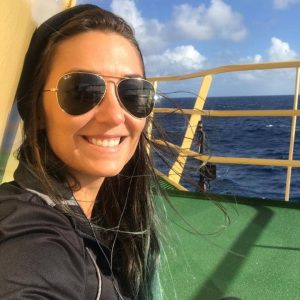 Jacqueline (Jacki) Long is a Research Technician in the Marine Biogeochemistry Group at the Monterey Bay Aquarium Research Institute (MBARI). As a previous Master’s student at the University of South Florida (USF), she led a suite of field campaigns in Everglades National Park, Florida to assess the optical and biogeochemical characteristics of whiting events – an in-water phenomenon where water becomes turbid with calcium carbonate. Additionally, she used thirteen-years of satellite and in situ environmental data to evaluate the occurrence of whiting events over time and better understand their processes of formation. While at USF, Jacki also developed a preliminary method of detecting chlorophyll-f using satellite remote sensing reflectance over Shark Bay, Australia. At MBARI she will participate in multiple projects, including the development of instrumentation for carbon cycle research on autonomous surface vehicles and the analysis of particulate inorganic carbon satellite algorithms in concert with the NASA EXPORTS field campaign in the North Pacific Ocean.
Jacqueline (Jacki) Long is a Research Technician in the Marine Biogeochemistry Group at the Monterey Bay Aquarium Research Institute (MBARI). As a previous Master’s student at the University of South Florida (USF), she led a suite of field campaigns in Everglades National Park, Florida to assess the optical and biogeochemical characteristics of whiting events – an in-water phenomenon where water becomes turbid with calcium carbonate. Additionally, she used thirteen-years of satellite and in situ environmental data to evaluate the occurrence of whiting events over time and better understand their processes of formation. While at USF, Jacki also developed a preliminary method of detecting chlorophyll-f using satellite remote sensing reflectance over Shark Bay, Australia. At MBARI she will participate in multiple projects, including the development of instrumentation for carbon cycle research on autonomous surface vehicles and the analysis of particulate inorganic carbon satellite algorithms in concert with the NASA EXPORTS field campaign in the North Pacific Ocean.
Whether you have been working with satellite remote sensing and/or ocean color data for years, or just needed to Google “ocean color data”, I highly recommend taking this course. Remote sensing data analysis is a wonderful skill that can be applied within most earth sciences disciplines. The Cornell Satellite Remote Sensing Workshop orchestrated by Bruce Monger will give you an entire arsenal of new tools that can be used to enhance your research, plus you will learn that cool new language on the block – Python. Bruce not only creates an amazing learning environment, but also ensures that your time outside of the workshop is equally enjoyable. I am so thankful to OCB and Dr. Monger for this experience.
Lauren Newell Ferris is a first year graduate student in the Coastal & Polar Physic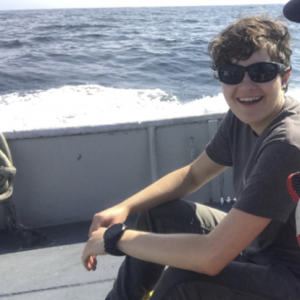 al Oceanography Lab at the Virginia Institute of Marine Science, advised by Dr. Donglai Gong. Laur’s research interests include Southern Ocean (sub)mesoscale dynamics and the use of autonomous sensing platforms. Laur graduated from MIT with a degree in Mechanical and Ocean Engineering in 2016 and spent a year working on marine oil spill response technology before deciding to become an oceanographer.
al Oceanography Lab at the Virginia Institute of Marine Science, advised by Dr. Donglai Gong. Laur’s research interests include Southern Ocean (sub)mesoscale dynamics and the use of autonomous sensing platforms. Laur graduated from MIT with a degree in Mechanical and Ocean Engineering in 2016 and spent a year working on marine oil spill response technology before deciding to become an oceanographer.
The Cornell Satellite Remote Sensing Program completely blew my expectations out of the water! Dr. Bruce Monger and teaching assistant Katherine Gershfeld (Cornell ’20) not only gave us a working knowledge of satellites and the algorithms that transform electromagnetic radiation into usable physical parameters; they provided us with the hard data-wrangling skills needed for satellite oceanography. I feel like I not only know about satellite oceanography but can actually do it. This course dually served as a Python programming boot camp, and I have since heavily incorporated Python into my own research. I have also already used Sea Surface Temperature (SST) data products from MODIS-Aqua in oceanographic activities; and I expect to use altimetry and wind skills from the course in the very near future. In addition to teaching us about satellite remote sensing, Bruce took great care to ensure that the class participants became a newly formed satellite oceanography community. Between camaraderie built during the much loved “Python Problem Set”, evening hangouts at the local bagel shop, and an awesome end-of-course picnic, I feel like I could email any of my classmates with a question about remote sensing (or just to say “hello”). Many thanks to Bruce and to Ocean Carbon & Biogeochemistry (OCB) for making this amazing experience possible!!!
Divya Panicker is a 2nd year PhD student in the school of Oceanography at the U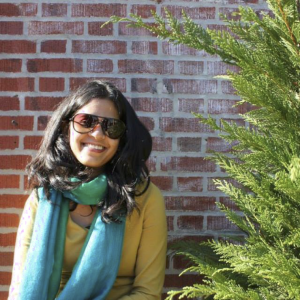 niversity of Washington, Seattle, and is advised by Dr. Kate Stafford. For her doctoral research she will be studying marine mammal community composition and distribution in Indian waters using visual and passive acoustic methods. Her research will also explore the role of oceanographic features in determining marine mammal distributions. Prior to joining Stafford’s lab, she carried out research projects on cetaceans in Lakshadweep and Kerala in India.
niversity of Washington, Seattle, and is advised by Dr. Kate Stafford. For her doctoral research she will be studying marine mammal community composition and distribution in Indian waters using visual and passive acoustic methods. Her research will also explore the role of oceanographic features in determining marine mammal distributions. Prior to joining Stafford’s lab, she carried out research projects on cetaceans in Lakshadweep and Kerala in India.
The satellite remote sensing in Cornell was an excellent experience where I learnt the background, basics and uses in satellite imaging. We also gained skills in python programming along the way. The course was superbly balanced between lectures, discussions and hands-on independent work. Dr. Bruce Monger and the TA, Katherine Gershfeld was extremely helpful and patient with every question. Bruce went above and beyond to provide a great learning atmosphere and encouraged students to collaborate during and after the course. I really enjoyed hanging out with all the students and all the great stuff we managed to do out of class too! I am very thankful to Bruce and OCB for giving me this amazing opportunity. This training will be extremely valuable to my research career.





